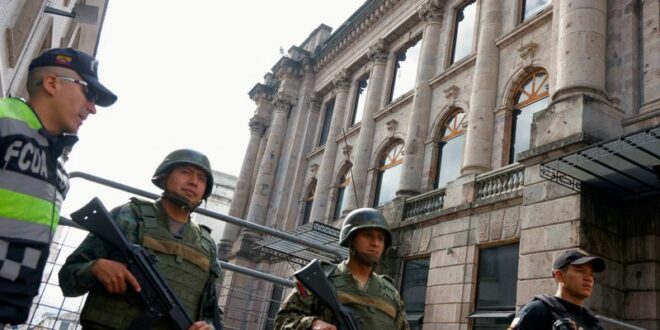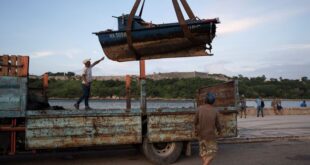(Reuters) – Ecuador has been rocked by a wave of violence in recent days, with schools and businesses shuttered, a nighttime curfew in place and residents fearful to leave their homes.
Violence is ongoing in Guayaquil, where three bodies were found in a burned-out car, and two police officers have been killed in the province that is home to Ecuador’s largest city. President Daniel Noboa has launched a military crackdown on gangs, looking to restore order as criminal groups hold more than 100 prison staff hostage and after armed men burst into a television studio and interrupted a live broadcast.
Here is a timeline of recent events leading up to the crisis.
April 3, 2022 – A prison riot in Cuenca, a city in southern Ecuador, leaves at least 20 inmates dead.
May 9, 2022 – Prison riots break out between members of rival gangs Los Lobos and R7, killing more than 40.
2023 – The government says 8,008 people lost their lives due to violence in 2023, more than double the figure in the prior year. Officials point to the growing reach of international drug trafficking gangs which move cocaine produced in South America.
May 17, 2023 – President Guillermo Lasso brings forward elections to avoid his likely impeachment, with his successor set to finish out the remaining 17 months of his term.
July 25, 2023 – More than 30 inmates are killed at a prison in Guayaquil, with Lasso deploying thousands of soldiers to wrest back control of the over-crowded facility.
Aug. 9, 2023 – Presidential candidate Fernando Villavicencio, who was running on an anti-corruption platform, is assassinated. Villavicencio made his name as a journalist decrying alleged criminal activity by politicians, members of the business community and several gangs.
September 2023 – A wave of violence hits the Andean nation as gangs blow up a bridge, attack prisons and kidnap guards and police officers.
Nov. 23, 2023 – Noboa, the son of a billionaire businessman, is sworn in as president. He pledges to combat violence with a slew of security measures.
Jan. 7 – Police say gang leader Adolfo Macias escaped from prison before a scheduled transfer to a maximum-security unit, a move that had been part of a push to increase safety at prisons. Macias had previously escaped from prison in 2013.
Jan. 8 – A wave of violence breaks out in at least six prisons, with around 150 prison guards and staff taken hostage by inmates. Some hostages are later freed. Noboa declares a state of emergency.
Jan. 9 – Violence hits the streets of Ecuador as two police officers are killed and seven others kidnapped. Three of those captives have been freed.
An armed group bursts into a television studio during a live broadcast and holds journalists at gunpoint. More than a dozen people in the group were arrested. Noboa names 22 criminal groups as terrorist organizations and launches a military crackdown.
Jan. 10 – Noboa announces Ecuador will start deporting foreign prisoners, especially Colombians, to cut down on its prison population.
(Reporting by Kylie Madry; Editing by Paul Simao)
 BeritaKini.biz Berita Viral Terkini di Malaysia
BeritaKini.biz Berita Viral Terkini di Malaysia





